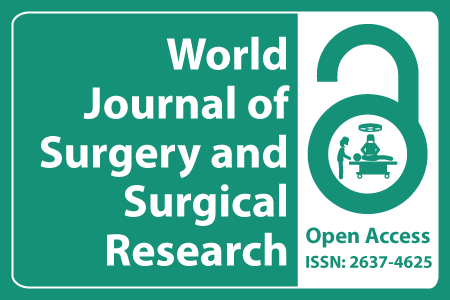
Journal Basic Info
- Impact Factor: 1.989**
- H-Index: 6
- ISSN: 2637-4625
- DOI: 10.25107/2637-4625
Major Scope
- Aesthetic & Cosmetic Surgery
- Colorectal Surgery
- Emergency Surgery
- Cancer Surgery
- Otolaryngology & ENT Surgery
- Robotic Surgery
- Breast Surgery
- Reconstructive Surgery
Abstract
Citation: World J Surg Surg Res. 2022;5(1):1362.DOI: 10.25107/2637-4625.1362
Early versus Delayed Cholecystectomy after Mild to Moderate Acute Biliary Pancreatitis: Results of a Comparative Prospective Study
Khiali R*, Ammari S, Nait Slimane N, Drai K, Ladada A, Haicheur EH and Taieb M
Department of General Surgery, University of Algiers, Algeria
*Correspondance to: Réda Khiali
PDF Full Text Research Article | Open Access
Abstract:
Introduction: The most frequent cause of acute pancreatitis is biliary lithiasis, which is distinguished by the efficacy of the etiological treatment in preventing recurrence through the use of cholecystectomy. The moderate variety (with no persistent failure of key vital functions) is the most frequent and allows for a cholecystectomy to be performed early. Despite academic societies' scientific consensus that cholecystectomy should be performed during the same hospitalization, the time between the beginning of pancreatitis and the etiological therapy has yet to be determined. The purpose of this study is to compare the outcomes of early cholecystectomy vs. delayed cholecystectomy. We are hypothesizing that early cholecystectomy will reduce the occurrence of biliary events without increasing complications. Materials and Methods: Patients with mild-to-moderate biliary AP were assigned to one of two groups: One with early cholecystectomy at 72 h and one with delayed cholecystectomy after this time. The frequency of biliary events (recurrence of AP, hepatic colic, acute cholecystitis, Common Biliary Duct (CBD) lithiasis, and angiocholitis) in both groups was assessed, as well as the length of hospital stay, conversion rate, operating duration, and complication frequency. Results: In our comparative study, 118 patients were included. Of these, 55 were operated at the first 72 h of the attack, and 63 were operated after this time. When surgery was performed between day 4 and 4 weeks after the AP attack, the late surgery group had a higher rate of biliary events (33.3% vs. 01.8%; p 10-3). Late surgery patients had a significantly longer hospital stay (4.56 vs. 12.10 days; p 10-6). In terms of the rate of conversion to laparotomy and the number of complications, there was no significant difference between the two groups. Conclusion: In mild to moderate ABP, early laparoscopic cholecystectomy reduces the risk of recurrent biliary events without an increase in operative difficulty or perioperative morbidity
Keywords:
Biliary pancreatitis; Early cholecystectomy; Biliary events
Cite the Article:
Khiali R, Ammari S, Nait Slimane N, Drai K, Haicheur EH, Taieb M. Early versus Delayed Cholecystectomy after Mild to Moderate Acute Biliary Pancreatitis: Results of a Comparative Prospective Study. World J Surg Surgical Res. 2022; 5: 1362..













